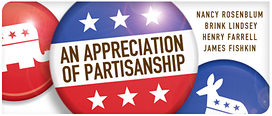Henry Farrell misreads me. Reason-based collective will formation and consensus are not the same thing. Deliberative Polls self-consciously avoid any promotion of consensus. That is why the results are collected in confidential questionnaires, or secret ballots, to avoid the distorting social pressure of consensus-based forms of deliberation. And that is why I dispute the common differentiation between “deliberative” and “aggregative” forms of democracy. My arguments favor deliberation for preference formation and aggregation (counting of votes) for decision. Sometimes there is more consensus sometimes less. There is no consistent pattern of decreased variance in opinion in our results. Put another way, there is nothing about deliberation that should rule out continuing strong disagreement (as Farrell appears to assume). Whether or not there is more agreement, at least people understand the reasons on either side and know what they are agreeing or disagreeing about. And at the end of the day, count the votes, but with reason-based preferences, not just manipulation and misinformation. That has always been my position. And a democracy focused just on winning political competitions without deliberation would be a democracy without meaningful collective will formation, as Schumpeterians admit.
When citizens deliberate in our processes there are significant changes of opinion more than two thirds of the time and the changes of opinion are driven by those who become more informed about the issues. There may be more agreement or less but it is reason and evidence driven at the end. My point about the role of partisans in deliberation is not a shift at all, as I have always advocated scientifically representative inclusion and balanced consideration of competing arguments. It is hard to have balance if you leave out those with strong opinions. Their views inform the others in discussion even if they do not change themselves. These points do not in any way affect my strong advocacy of a democracy in which citizens consider interests beyond self interest and partisanship. But it would be a sterile form of deliberation if people did not speak up for their own interests and if those with strong opinions were not included.

